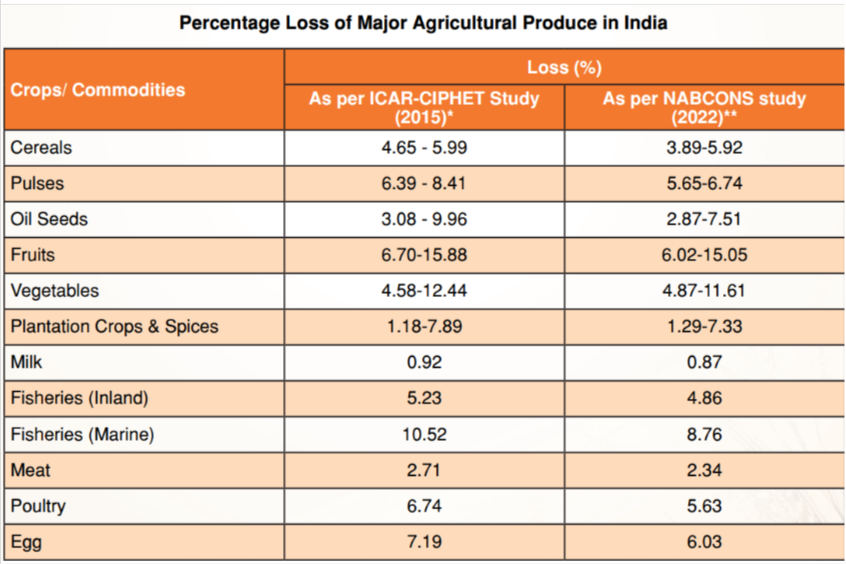Agnostic post-harvest losses waste management has established itself as a major industry problem since it negatively impacts fundamental aspects of food security and economic development alongside sustainability. The evaluation presented in Table 2.10 demonstrates the diverse levels of food processing between commodities, thus creating prospects for startup ventures to develop innovative solutions. The article examines why startup businesses should focus on agri-waste reduction while presenting opportunities alongside successful strategies for the industry.

The Extent of Food Processing
Coarse Cereals
- The IEG Study 2014 demonstrated that food processing activities grew significantly between 2005-06 and 2018-19 based on the data at 17.7%, 23.3%, 28.3%, and 29.4%, respectively.
- Progress in coarse cereal processing continues to rise, thereby creating new business prospects for start-ups to improve processing methods while diminishing post-harvest losses.
Fruits
- The number of processed fruits expanded from 1.75% in 2005-06 to 2.4% in 2010-11, 2.9% in 2015-16, and lastly reached 4.5% in 2018-19.
- The current fruit processing level remains low even though it has grown, thus opening doors for startup companies to create new advanced fruit processing technologies.
Vegetables
- Vegetable processing numbers experienced movements throughout the period, starting with 3.69% in 2005-06, then dropping to 2.27% in 2010-11, followed by a lower movement to 2.22% in 2015-16, and ending with 2.70% in 2018-19.
- The current processing methods should be improved because they do not satisfy the needs of the vegetable industry for post-harvest loss reduction and extended shelf life extension.
Milk
- The processing rate for milk experienced a remarkable upward trend starting from 11.4% in 2005-06 until reaching 5.7% in 2010-11 before it underwent a substantial increase to reach 20.1% in 2015-16 and 21.1% in 2018-19.
- Startup companies should utilize contemporary dairy processing methods that minimize losses and enhance quality in their operations.
Fish
The fish processing sector achieved a 14.08% rate in 2005-06 but decreased to 7.66% in 2010-11 before reaching 8.3% in 2015-16 and finally reaching 15.4% in 2018-19.
Processed fish product demand continues to rise, which creates excellent possibilities for new business startups within this sector.
Meat
The meat processing industry witnessed a remarkable growth in its processing rate from 6.12% in 2005-06 to 11.4% in 2010-11 before it further increased to 22.7% in 2015-16 and again to 34.2% in 2018-19.
New businesses should concentrate on creating modern meat processing systems which minimize spoilage during storage periods while satisfying the growing consumer market for processed meat items.
The Economic Transformation of India’s Food Processing Sector
The Business Case for Agri-Waste Reduction
Economic Benefits
Farmers, along with agricultural businesses, would get a substantial increase in their income by lowering their post-harvest waste. The improvement of processing methods through startups provides farmers with enhanced market worth, which leads to financial stability.
Environmental Sustainability
Agri-waste reduction achieves environmental sustainability through minimizing requirements of new agricultural land and additional farming resources. Startup enterprises should create sustainable processing methods that reduce waste numbers and foster environmentally friendly procedures.
Market Opportunities
Startups have a major commercial prospect due to the expanding market for processed foods. Agri-waste reduction offers startups a chance to penetrate the processed food market, through which they can build solid business presence.
Technological Innovation
Business startups benefit from employing smart packaging solutions together with cold chain systems and automated production equipment, which help minimize loss of crops after harvesting. The technological advances improve both product quality along with shelf duration and boost operational efficiency rates.
Policy Support
National governments throughout the world create new policies and give financial advantages to encourage agri-waste reduction programs. The policies created by governments give startups the opportunity to obtain funding resources alongside grants and technical support, allowing startups to improve their expansion rate and social influence.
Strategies for Success
Develop Innovative Processing Technologies
Companies that launch should dedicate their resources to creating complex processing systems that manage post-harvest waste reduction with elevated product standards. Startups require smart packaging solutions together with advanced preservation methods and automated processing equipment to fight agri-waste reduction.
Leverage Data and Analytics
Startup companies that use data analytics systems can improve operational effectiveness and base their decisions on factual data. Startups performing market analysis combined with consumer preference and supply chain analysis enable them to establish solutions that resolve selected agri-waste reduction obstacles.
Collaborate with Farmers and Suppliers
The success of a steady, high-quality raw material supply depends heavily on creating strong partnerships between farmers and suppliers. Startups need to team up with farmers for implementing sustainable farming methods and helping farmers enhance their harvesting methods while diminishing agricultural harvest before harvest time.
Focus on Branding and Marketing
The market demands startups to develop unique brand positions, which helps them stand out from their competitors. Startups that promote their dedication to agri-waste reduction and sustainability will obtain customers who prioritize these values while building a devoted client network.
Explore New Markets
The expansion of startup operations requires businesses to pursue fresh markets along with alternate distribution systems. Startup strategies should either extend operations to rising markets throughout Southeast Asia and Africa or utilize online e-commerce platforms to expand their reach.
List Of 8 Most Successful Business Ideas for Startup
Conclusion
The issue of preventing post-harvest losses offers a major business opportunity that startups should explore. The focus on agri-waste reduction allows startups to create economic growth and environmental preservation while benefiting from a developing market sector for processed food products. Startups operating in the food processing area can build their market dominance through innovative processing solutions, supplier-farmer partnerships, analytical exploitation, and brand development combined with market expansion into new regions to reduce agri-waste substantially.
Startup businesses which want to address post-harvest losses while exploiting agri-waste reduction opportunities can get complete consulting from Niir Project Consultancy Services (NPCS) to handle the food processing industry challenges. You can reach NPCS at https://www.niir.org/ to discover the ways they will help you create an effective business plan and succeed in your mission to reduce agri-waste.